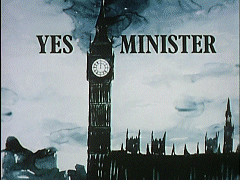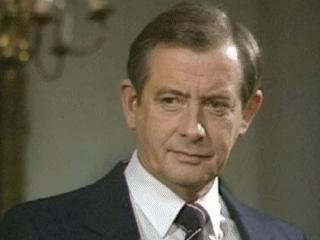Related Research Articles

Her Majesty's Home Civil Service, also known as Her Majesty's Civil Service or the Home Civil Service, is the permanent bureaucracy or secretariat of Crown employees that supports Her Majesty's Government, which is composed of a cabinet of ministers chosen by the Prime Minister of the United Kingdom of Great Britain and Northern Ireland, as well as two of the three devolved administrations: the Scottish Government and the Welsh Government, but not the Northern Ireland Executive.

Yes Minister is a British political satire sitcom written by Antony Jay and Jonathan Lynn. Comprising three seven-episode series, it was first transmitted on BBC2 from 1980 to 1984. A sequel, Yes, Prime Minister, ran for 16 episodes from 1986 to 1988. All but one of the episodes lasted half an hour, and almost all ended with a variation of the title of the series spoken as the answer to a question posed by Minister Jim Hacker. Several episodes were adapted for BBC Radio; the series also spawned a 2010 stage play that led to a new television series on Gold in 2013.
Minister of State is a title borne by politicians or officials in certain countries governed under a parliamentary system. In some countries a 'Minister of State' is a junior minister, who is assigned to assist a specific cabinet minister. In other countries a 'Minister of State' is a holder of a more senior position, such as a cabinet minister or even a head of government.
A parliamentary secretary is a member of Parliament in the Westminster system who assists a more senior minister with their duties. In several countries the position has been re-designated as assistant minister.
The Chief Whip is a political office whose task is to administer the whipping system that tries to ensure that members of the party attend and vote as the party leadership desires.
A cabinet secretary is usually a senior official who provides services and advice to a cabinet of ministers as part of the Cabinet Office. In many countries, the position can have considerably wider functions and powers, including general responsibility for the entire civil service.

A Parliamentary Private Secretary (PPS) is a Member of Parliament (MP) in the United Kingdom who acts as an unpaid assistant to a minister. He or she is selected from backbench MPs as the 'eyes and ears' of the minister in the House of Commons.

The Privy Council Office is the central agency of the Government of Canada which acts as the secretariat to the Cabinet of Canada – a committee of the Privy Council for Canada – and provides non-partisan advice and support to the Canadian ministry, as well as leadership, coordination, and support to the departments and agencies of government.
In Canada, a deputy minister is the senior civil servant in a government organization, who acts as deputy head. Deputy ministers take political direction from a minister of the Crown, who is typically an elected member of Parliament and responsible for the department.
A permanent secretary, or permanent under-secretary, is the most senior civil servant of a ministry in the United Kingdom, charged with running the department on a day-to-day basis. Similar offices, often employing different terms, exist in many other Westminster-style systems and in some other governments.

James George Hacker, Baron Hacker of Islington,, BSc (Lond.), Hon. DCL (Oxon.) is a fictional character in the 1980s British sitcom Yes Minister and its sequel, Yes, Prime Minister. He is the Minister of the (fictional) Department of Administrative Affairs, and later the Prime Minister. He was portrayed by Paul Eddington in the original show; in the 2013 revival he was portrayed by David Haig.

Sir Humphrey Appleby is a fictional character from the British television series Yes Minister and Yes Prime Minister. He was played originally by Sir Nigel Hawthorne, both on stage and in a television adaptation of the stage show by Henry Goodman in a new series of Yes, Prime Minister. In Yes Minister, he is the Permanent Secretary for the Department of Administrative Affairs. In the last episode of Yes Minister, "Party Games", he becomes Cabinet Secretary, the most powerful position in the service and one he retains during Yes, Prime Minister. Hawthorne's portrayal won the BAFTA Award for Best Light Entertainment Performance four times: 1981, 1982, 1986 and 1987.

Sir Bernard Woolley, GCB, MA (Oxon) is one of the three main fictional characters of the 1980s British sitcom Yes Minister and its sequel, Yes, Prime Minister. He was portrayed originally by Derek Fowlds, with Chris Larkin taking on the part for the 2013 revival.
Undersecretary is a title for a person who works for and has a lower rank than a secretary. It is typically used in the executive branch of government and has different meanings in different political systems.
"The Bed of Nails" is the nineteenth episode of the BBC comedy series Yes Minister, first broadcast 9 December 1982, in which Jim Hacker unwisely accepts the role of 'Transport Supremo' with a view to developing a 'National Integrated Transport Policy' for the UK. It soon becomes apparent that opposition from various transport interests, the unions, and elements within the Department of Transport itself will make implementation impossible, and the policy is promptly ditched following a number of carefully calculated 'leaks'.
The title secretary of state or state secretary is commonly used for senior or mid-level posts in governments around the world. The role varies between countries, and in some cases there are multiple secretaries of state in the government.

The Cabinet Secretary is the top-most executive official and senior-most civil servant of the Government of India. The Cabinet Secretary is the ex-officio head of the Civil Services Board, the Cabinet Secretariat, the Indian Administrative Service (IAS), and all civil services under the rules of business of the government.

The Cabinet Secretary is the most senior civil servant in the United Kingdom, and is based in the Cabinet Office. The person in this role acts as the senior policy adviser to the prime minister and Cabinet and as the secretary to the Cabinet, is responsible to all ministers for the efficient running of government. The role is currently occupied by Simon Case.

Sir Oliver Robbins is a former senior British civil servant who served as the Prime Minister's Europe Adviser and the chief Brexit negotiator from 2017 to 2019. He was a controversial figure amongst Brexit supporters. He previously served as the Permanent Secretary at the Department for Exiting the European Union from July 2016 to September 2017, and as the Prime Minister's Advisor on Europe and Global Issues from June 2016 to July 2016. Since 2019, he is an investment advisor at Goldman Sachs.

The Bangladesh Administrative Service (BAS) is the premier civil service cadre of the Bangladesh Civil Service, and which formulates and executes the policies of the government of the People's Republic of Bangladesh of which it is an inseparable part.
References
- ↑ Sainty, J. C. (1973). "Introduction". Office-Holders in Modern Britain: Volume 2 - Officials of the Secretaries of State 1660-1782. University of London. pp. 1–21.
Something should be said at this point about Private Secretaries. In the establishments of the Home, Foreign and War Offices drawn up in 1795 provision was made for salaried Private Secretaries to the Secretaries of State. Before 1782, however, the arrangements in this respect lacked definition and appear to have varied widely.
- 1 2 3 4 5 "Ministers' private offices". Institute for Government.
- ↑ Lee, John Michael; George William Jones; June Burnham (1998). At the centre of Whitehall: advising the Prime Minister and Cabinet. Palgrave Macmillan. pp. 42–44. ISBN 978-0-312-17730-0.
- ↑ (PDF) https://www.civilservant.org.uk/library/2010_Bowles-The_Role_Of_The_Private_Secretary.pdf.Missing or empty
|title=(help) - ↑ "UK Civil Service - Key Skills - Working with Ministers". www.civilservant.org.uk. Retrieved 2021-03-20.
- ↑ "Lurking your way to the top: life as a private secretary". Civil Service World. 2020-06-25. Retrieved 2021-03-20.
- ↑ "The importance of a Private Secretary – the most trusted of royal aides". Royal Central. 2021-01-22. Retrieved 2021-03-21.
- ↑ "Remarks by the Principal Private Secretary Clive Alderton at the Annual Review 2018 Media Briefing | Prince of Wales". www.princeofwales.gov.uk. Retrieved 2021-03-21.
- ↑ "Consolidated Instructions to the appointment of personal staff to Union Ministers" (PDF). Ministry of Personnel, Public Grievances and Pensions. Archived from the original (PDF) on 12 December 2014. Retrieved 26 May 2014.
- ↑ "Why babus want to be private secys to ministers now". GovernanceNow.com. Retrieved 16 May 2015.
- ↑ http://persmin.gov.in/dopt_csdivision_index.asp.Missing or empty
|title=(help) - ↑ http://www.archive.india.gov.in/knowindia/profile.php?id=32.Missing or empty
|title=(help) - ↑ Member CBEC
- ↑ Member Railway Board
- ↑ P.S.O., Principal Staff Officer
- ↑ Member of the Central Board for Excise and Customs